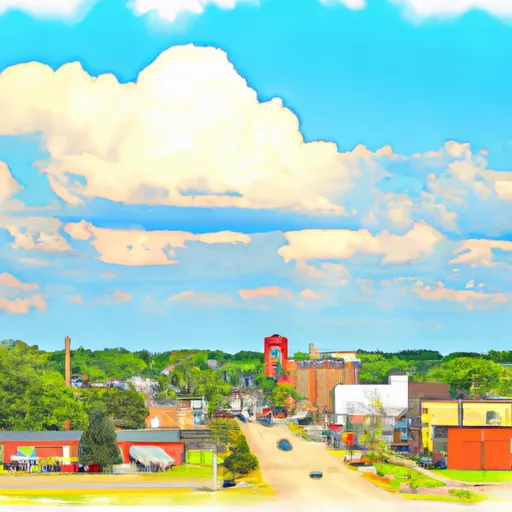-
 Snoflo Premium
Snoflo Premium
Get unlimited access to all our content
With no Ad interruptions! - Start Your Free Trial Login with existing account
Holton
Eden Index
Climate
6.9
•
Recreation
5.1
•
Community
2.0
•
Safeguard
5.0/10

Holton, Michigan, is a small rural community located in Muskegon County. The climate in Holton is characterized by warm summers and cold winters. Average temperatures range from 25°F (-4°C) in winter to 80°F (27°C) in summer. The region experiences precipitation throughout the year, with July being the wettest month and February being the driest.
Hydrologically, Holton is situated near the Muskegon River, one of the largest water bodies in the area. The river provides opportunities for fishing, boating, and kayaking. Numerous lakes are also scattered around Holton, including Twin Lake and Horseshoe Lake, offering additional recreational activities like swimming and water sports.
Outdoor enthusiasts in Holton can enjoy an array of recreational opportunities. The area is surrounded by lush forests, making it ideal for hiking, camping, and wildlife observation. Holton is also home to several parks and trails, such as the Holton Township Community Park and the Holton Township Nature Trail, which provide opportunities for picnicking, biking, and birdwatching.
In conclusion, Holton, Michigan, offers a climate with distinct seasonal variations, hydrologically benefiting from its proximity to the Muskegon River, and a range of outdoor recreational activities centered around its natural landscapes.
What is the Eden Index?
The Snoflo Eden Index serves as a comprehensive rating system for regions, evaluating their desirability through a holistic assessment of climate health, outdoor recreation opportunities, and natural disaster risk, acknowledging the profound impact of these factors on livability and well-being.
Climate Health Indicator (CHI): 6.9
Holton receives approximately
900mm of rain per year,
with humidity levels near 81%
and air temperatures averaging around
8°C.
Holton has a plant hardyness factor of
5, meaning
plants and agriculture in this region thrive during a short period during spring and early summer. Most
plants will die off during the colder winter months.
By considering the ideal temperature range, reliable water supplies, clean air, and stable seasonal rain or snowpacks, the Climate Health Indicator (CHI) underscores the significance of a healthy climate as the foundation for quality living.
A healthy climate is paramount for ensuring a high quality of life and livability in a region, fostering both physical well-being and environmental harmony. This can be characterized by ideal temperatures, reliable access to water supplies, clean air, and consistent seasonal rain or snowpacks.
Weather Forecast
Streamflow Conditions
Northeastern Lake Michigan
Area Rivers
Northeastern Lake Michigan
Snowpack Depths
Northeastern Lake Michigan
Reservoir Storage Capacity
Northeastern Lake Michigan
Groundwater Levels
Recreational Opportunity Index (ROI): 5.1
The Recreational Opportunity Index (ROI) recognizes the value of outdoor recreational options, such as parks, hiking trails, camping sites, and fishing spots, while acknowledging that climate plays a pivotal role in ensuring the comfort and consistency of these experiences.
Access to outdoor recreational opportunities, encompassing activities such as parks, hiking, camping, and fishing, is crucial for overall well-being, and the climate plays a pivotal role in enabling and enhancing these experiences, ensuring that individuals can engage in nature-based activities comfortably and consistently.
Camping Areas
| Campground | Campsites | Reservations | Toilets | Showers | Elevation |
|---|---|---|---|---|---|
| Blue Lake County Park | 25 | 670 ft | |||
| Twelvemile - Pictured Rocks National Lakeshore | None | 620 ft | |||
| Van Buren State Park | 220 | 642 ft | |||
| Minnie Pond | 18 | 850 ft | |||
| Kingston Lake - State Forest | 16 | 824 ft | |||
| Nichols Lake | 34 | 910 ft | |||
| Covert Park | 60 | 658 ft | |||
| Pines Point | 94 | 717 ft | |||
| Fremont Lake City Park | None | 747 ft | |||
| Mississinewa Lake - Miami Recreation Area | 430 | 764 ft |
Nearby Ski Areas
Catastrophe Safeguard Index (CSI):
The Catastrophe Safeguard Index (CSI) recognizes that natural disaster risk, encompassing floods, fires, hurricanes, and tornadoes, can drastically affect safety and the overall appeal of an area.
The level of natural disaster risk in a region significantly affects safety and the overall livability, with climate change amplifying these risks by potentially increasing the frequency and intensity of events like floods, fires, hurricanes, and tornadoes, thereby posing substantial challenges to community resilience and well-being.
Community Resilience Indicator (CRI): 2.0
The Community Resilience Indicator (CRI) recognizes that education, healthcare, and socioeconomics are crucial to the well-being of a region. The CRI acknowledges the profound impact of these elements on residents' overall quality of life. By evaluating educational resources, healthcare accessibility, and economic inclusivity, the index captures the essential aspects that contribute to a thriving community, fostering resident satisfaction, equity, and social cohesion.

